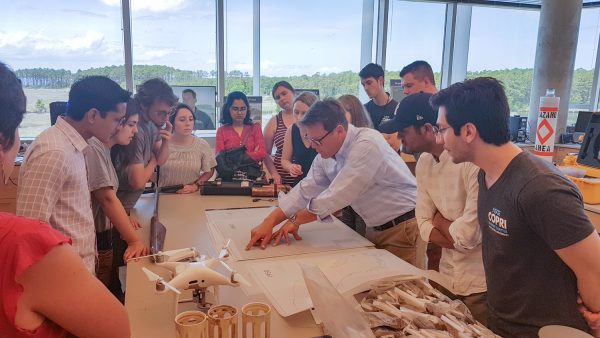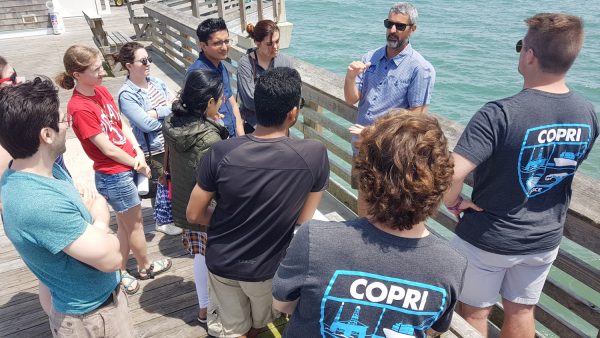The NC State student chapter of the Coasts, Oceans, Ports, and Rivers Institute (COPRI) traveled to the North Carolina Outer Banks for their 3rd annual spring field trip in late May. COPRI’s mission is to provide opportunities for members, most of whom are graduate students, to get out from behind their desks and into coastal environments to experience first-hand research and engineering projects, as well as facilitate networking with professionals from a wide variety of fields. The annual field trip accomplishes these goals in unique ways for each student.

The trip included visits to the Coastal Studies Institute (CSI) in Manteo, NC; the Army Corps of Engineers Field Research Facility (FRF) in Duck, NC; and Jennette’s Pier, part of the North Carolina Aquarium Society in Nags Head, NC. Scientists and engineers at these facilities are leading projects related to a range of coastal issues, including topics related to research being conducted by COPRI members at NC State.
Several COPRI members are engaged in research regarding beach and dune erosion, which is a recurrent problem along the NC coast, especially during storms. Leaders at the FRF and CSI shared their knowledge, and current research, of different aspects of these processes. COPRI members learned about how engineered structures can help or hinder bank stabilization, as well as how the physical processes of runup and wave breaking can redistribute sediments on the open coast.
“I’ve been working on models for beach and dune erosion during Hurricane Isabel, based on observations collected before and after the storm. It is fascinating to see how the advanced tools at FRF collect and process data in real-time and during the storm.“ Alireza Gharagozlou, COPRI chapter President
Other research projects at these facilities are focused on the use of marine hydrokinetic devices in the Gulf Stream, including the impact these devices might have on marine mammals. Each of these projects is made possible by a wide array of instruments and vehicles to collect data that many students have used in their research.
“I’ve used the data from a Waverider buoy dozens of times, but it’s really awesome to see one up close.” said Russell Nasrallah, a second year masters student in coastal engineering at NC State.

COPRI members were also introduced to education activities, including summer camps for K-12 students to learn about coastal issues. CSI and Jennette’s Pier both offer outdoor classes like surfing and scuba diving, as well as science courses that teach geology, oceanography, engineering, and biology. These classes are always looking for mentors and teachers, which was of great interest to some COPRI members. The contacts made at both of these organizations will serve as a conduit through which members can become involved in educating the next generation of curious scientists and engineers.
Chloe Stokes, an undergraduate environmental engineering student at NC State, said: “The 2019 COPRI field trip to the NC Outer Banks was an enlightening experience that encouraged me to continue pursuing coastal engineering and research. I learned about renewable energy sources, wildlife protection, and development of coastal modeling technology.”
We are grateful for the hosts at each of the sites who volunteered their time to inform and interact with COPRI members.

